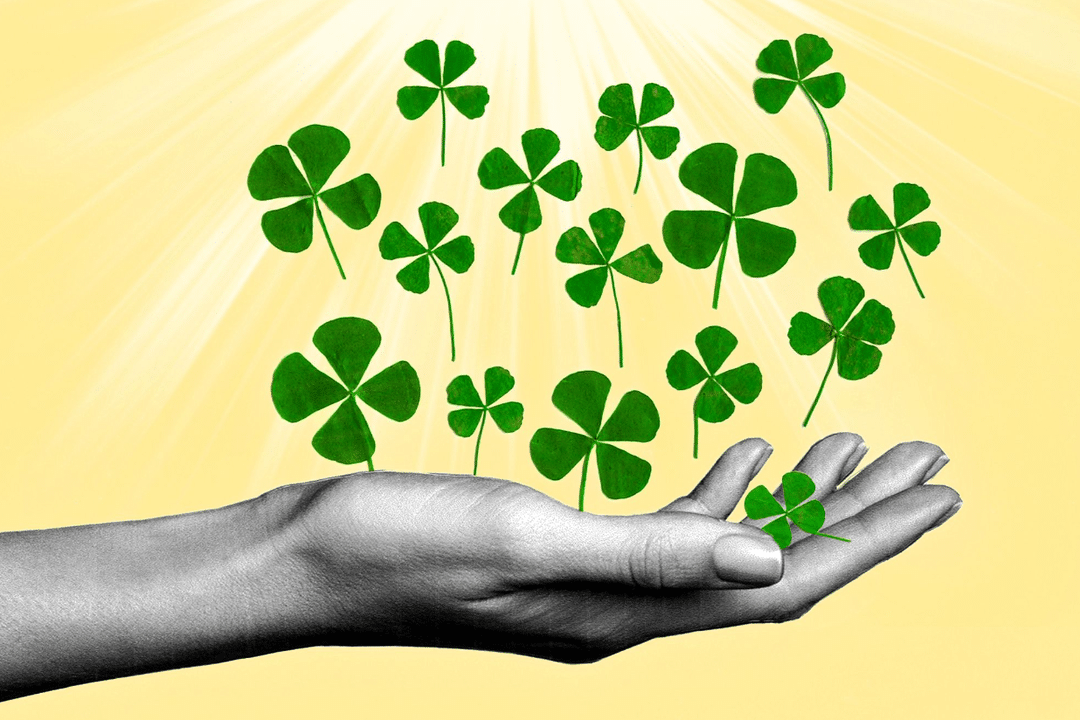
Nir Zicherman was a mediocre law student having trouble landing a summer internship. On his way to an interview, he got in an elevator and made a joke to the woman next to him, who was holding a tray of coffee cups.
“You must really like coffee,” he said. It changed his life.
The woman, it turned out, was the hiring manager for the job he was going for in NASA’s legal department. She loved the joke and gave him the internship. The summer stint inspired Zicherman to teach himself to code, scrap his law career for tech and eventually co-found a startup. He sold it to Spotify for millions in 2019.
“It’s just, like, everything can be traced back to that one elevator ride,” says Zicherman, now an entrepreneur and writer in New Jersey.
We like to think we will our success into existence with our own hard work. And yet, so many of us knock wood, consult tarot cards and read horoscopes, or repeat affirmations to manifest our way to happiness. (TikTok, of course, has a term for it: “Lucky girl syndrome.”)
It feels like our fate often comes down to circumstance and coincidence, maybe even a bit of magic. But we have more power than we think to make ourselves luckier.
You can create your own serendipity, says Richard Wiseman, a psychology professor at England’s University of Hertfordshire and author of a seminal book on luck. He and his team studied hundreds of people who considered themselves especially lucky or unlucky. The former tended to be cheery, optimistic, open and resilient. The latter had their metaphorical heads down, unable to spot and seize opportunities.
“When you are stressed and worried and anxious, you gain a kind of tunnel vision,” Wiseman says.
In one experiment, participants were told to count photographs in a newspaper. The self-described unlucky swept past half-page ads that revealed the answer to the task. Instead of quickly completing the assignment and collecting their cash prize, they just kept poring over the paper.
“
When you are stressed and worried and anxious, you gain a kind of tunnel vision.
Change your mindset
Conjure a positive, expansive outlook by creating a “luck diary,” Wiseman says. Record a good thing that happened that day, or something bad from the past that’s not happening anymore. Since emotions are contagious, your good mood and sense of possibility can rub off on others, he says. Those people could make things happen for you: funding your idea, making an exception in your favor or connecting you with the love of your life.
Next, try eating a new food, watching a movie you wouldn’t normally watch or rearranging your furniture. You’re showing yourself that you’re a flexible person, Wiseman says. Unlucky people tend to see just one way forward. Lucky people set a goal but stay open to various ways of getting there.
The power of chance
Bad news for the try-hards: Intelligence and ability only get you so far.
“Luck matters as much as talent,” says Alessio Emanuele Biondo, an associate professor at Italy’s University of Catania who researches economic policy.
In a 2018 paper, he and co-authors created a computer simulation where 1,000 people were exposed to 1,000 random events over a 40-year-career. Half of the events were positive, represented by green dots. Half were negative, symbolized by red dots. Each individual was assigned a different level of intelligence, ability and effort.
The workers who reached the heights of success were hardly ever the ones with the most talent, the model found. Instead, the biggest winners had average talent but had been spurred by random luck, hitting more green dots. So many things beyond our control—where we’re born, our family wealth—can set the trajectory of our lives, Biondo notes.
Laura Knight, a creative director who works in toy packaging, grew up the eldest child of a single immigrant mother. Obsessed with reaching financial stability, she said no to opportunities that felt too risky. There was the entrepreneur who invited her to join what turned out to be a wildly successful startup, the film-industry executive who promised her a screenwriting gig after high school. Looking back, she regrets all the chances she didn’t grab.
“I was scared,” says the 43-year-old, who lives in San Antonio.
This summer, she got up the nerve to accomplish a longtime dream, launching her own mermaid-themed trading card game. She was shocked when orders immediately began pouring in. It turned out Netflix had premiered a show called “MerPeople” that coincided perfectly with her game. Taking a chance on herself had paid off.
Connect the dots
Serendipity is about connecting the dots between yourself and other people, says Christian Busch, an associate professor at the University of Southern California and author of the book, “The Serendipity Mindset.”
Instead of introducing yourself with just your job when you meet a new person, throw out three information points that reveal your many facets, he recommends. You’re intrigued by black holes, planning a canoe trip and figuring out how to parent your two-year-old. The approach, which Busch calls the “hook strategy,” increases your chances of establishing a deep connection with someone, or unearthing a coincidence.
If you’re nervous to talk to someone new or pitch an idea, Busch suggests asking yourself: What’s the worst that could happen if I don’t do it?
Should a hurdle pop up while you’re trying to make good on a goal, try flipping your thinking, he adds. Instead of seeing the issue as something destroying your plan, reframe it as a detour that becomes part of the plan. We’re often convinced things in our lives are terrible luck, only to realize later that the roadblock propelled us down a new, wonderful path.
Years ago, planning a budget trip to Europe, I was crestfallen to find that my dream beachfront hostel in Barcelona was fully booked. Annoyed, I snagged a spot at another place.
I was right: The new hostel wasn’t anything special. But in the common room, I started talking to a guy. It turned out we had both graduated from the same university a couple of weeks prior.
We are now happily married with two children. I still can’t believe my luck.
IMPORTANT DISCLOSURES Broadridge Investor Communication Solutions, Inc. does not provide investment, tax, legal, or retirement advice or recommendations. The information presented here is not specific to any individual's personal circumstances. To the extent that this material concerns tax matters, it is not intended or written to be used, and cannot be used, by a taxpayer for the purpose of avoiding penalties that may be imposed by law. Each taxpayer should seek independent advice from a tax professional based on his or her individual circumstances. These materials are provided for general information and educational purposes based upon publicly available information from sources believed to be reliable — we cannot assure the accuracy or completeness of these materials. The information in these materials may change at any time and without notice.
Prepared by Broadridge Investor Communication Solutions, Inc. Copyright 2021.
